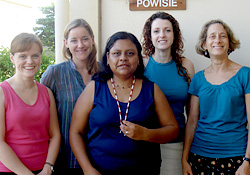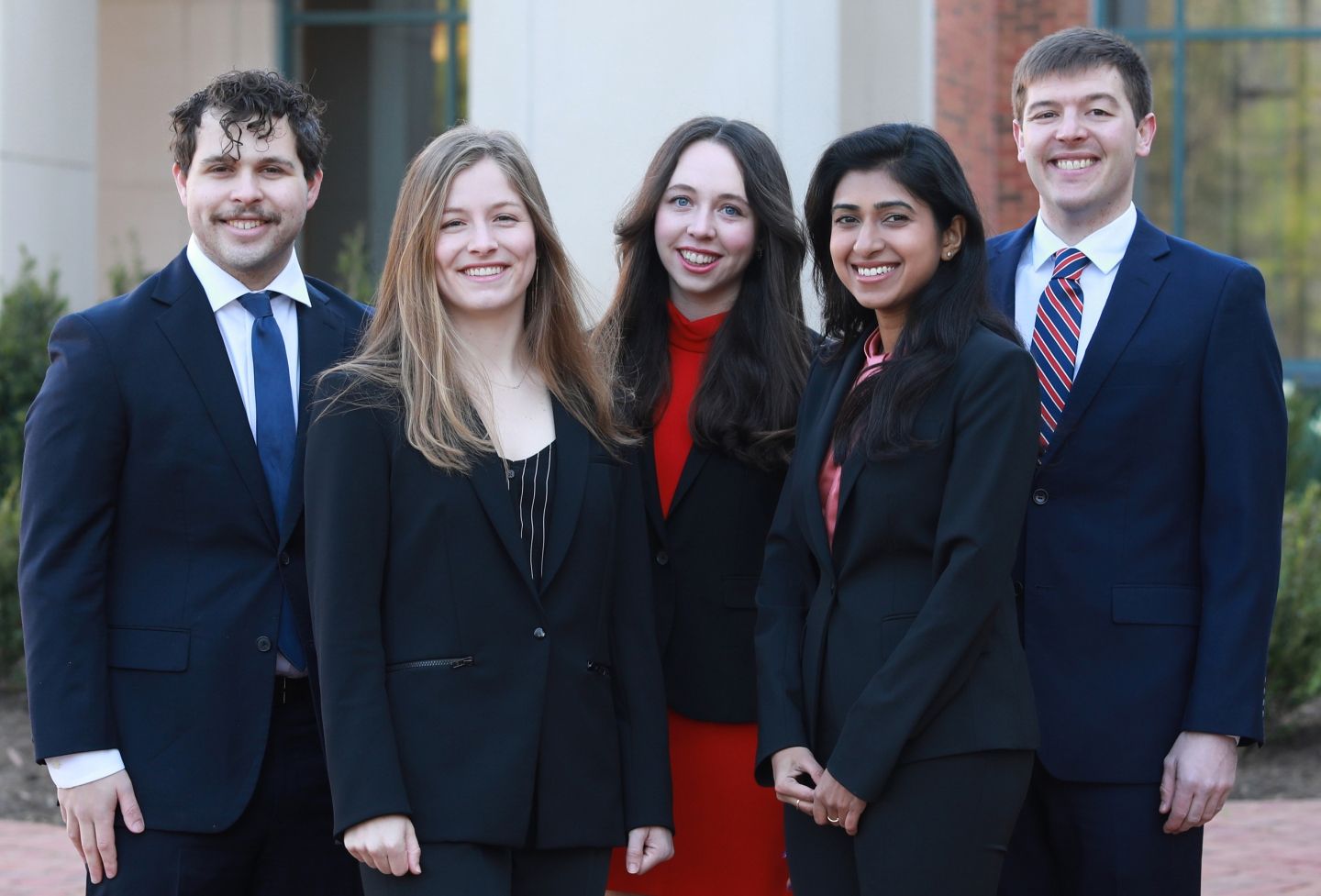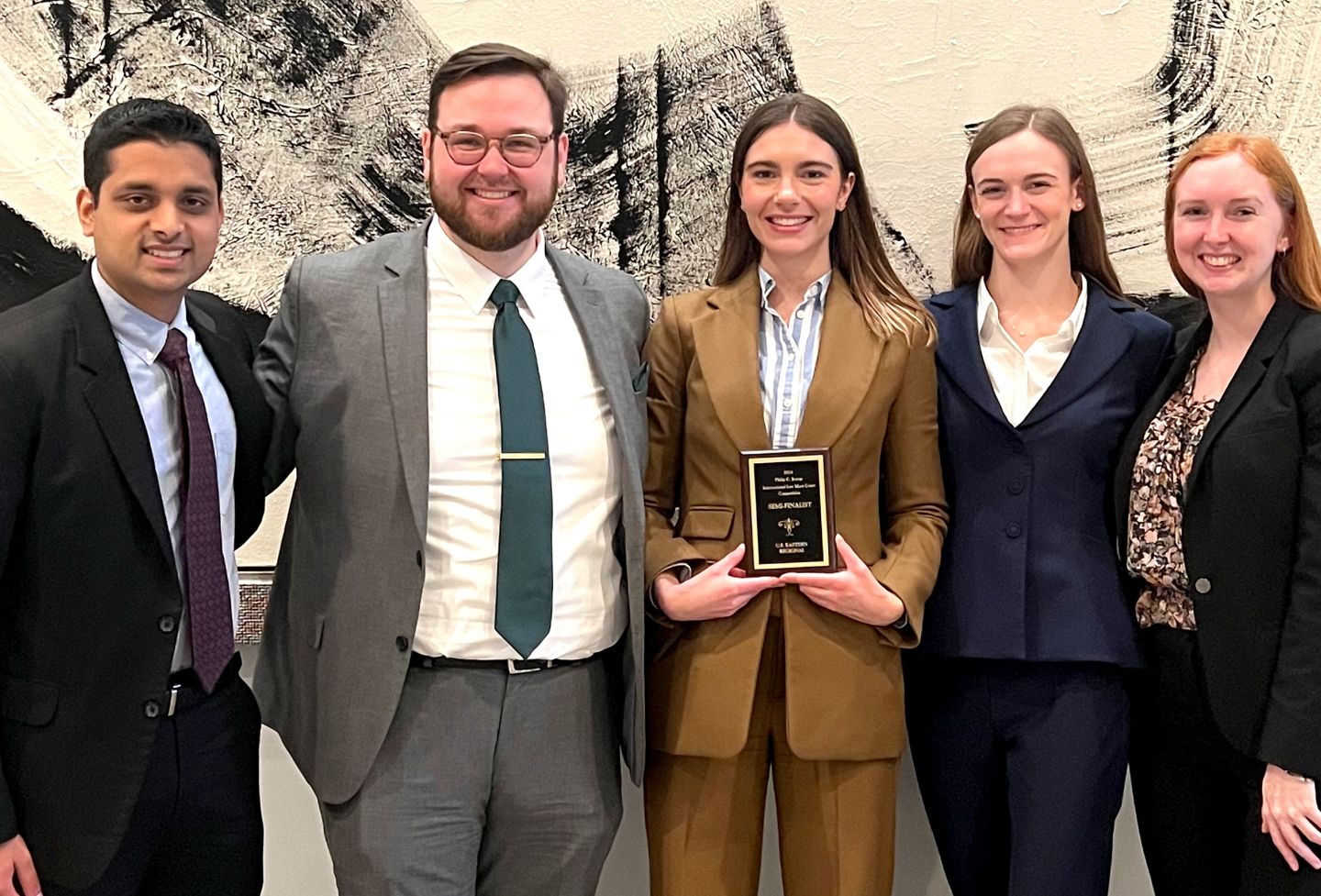Human Rights Clinic Passes Reality Test in Suriname
Students in the semester-long International Human Rights Clinic have worked on projects for organizations ranging from Human Rights First in New York City to the Tebtebba Foundation in the Philippines. But the limits of being a law student often prevent direct contact with clients as well as visits to countries where human rights efforts are focused. This summer clinic professor Deena Hurwitz and three rising third-year students — Kate Flatley, Kristin Flood and Allissa Pollard — took the clinic experience on the road. The team recently returned from Suriname, where they presented a workshop on the rights of indigenous peoples to education.

"It was a great experience," said Flood. "We had the chance to apply practical skills in a real world environment...I hadn't really given much thought to the human aspect of client relations [before], but the contact with all of the people involved with the clinic was great."
Hurwitz, now in her fifth year as director of the clinic and the Law School's Human Rights Program, sought to broaden her students' perspective and the clinic's effectiveness by taking students into a real-world setting.
"Students see first-hand how much work local advocates have to do to work with the various forces at play: local and national governments, churches and NGOs," Hurwitz said. "My goal is to have students working on real projects, not simulations. It was such an exciting trip to have the students going into the field. It adds a dimension you can't duplicate in the classroom."
In her own career Hurwitz has served as director of the International Human Rights Law Group's Bosnia program and in Ramallah in Israeli-occupied Palestinian Territory with the Centre for International Human Rights Enforcement. The opportunity to give students a similar in-country experience came when Fergus MacKay, a well-known indigenous rights activist who has worked in Suriname, suggested that Hurwitz and her students draft a training manual for the indigenous people of Suriname on the rights to education and health.
MacKay and his organization, the U.K.-based Forest Peoples Programme, have been working for several years in Suriname on land-rights issues in cooperation with a local indigenous group, VIDS (a Dutch acronym for the Association of Indigenous Village Leaders). This past spring MacKay asked the Law School's Human Rights Clinic to work with Ellen-Rose Kambel, a Surinamese lawyer, indigenous rights expert, and a VIDS consultant, to design a workshop with VIDS and to finalize the education section of the manual. Hurwitz recognized that the opportunity for students to conduct the workshop would fulfill one of the goals of the clinicâ"to provide students with practical experience that reflects the range of activities in which lawyers engage to promote respect for human rights."
After three semesters, during which time the nearly 50-page manual evolved, Hurwitz and her students were ready to test their project on the real world. By July 1 they were in the air and headed for Paramaribo, the capital of Suriname.
Working in the Real World
Suriname, a former Dutch colony, has only been independent since 1975. Schools are a key area with which the government has struggled.
"There are a lot of issues with regard to education for indigenous communities, not the least of which is geographic," Hurwitz said. "Access to schools is a big problem. You might have one school for five communities separated by some distance. Often, there's no bus, so children have to walk to get to school, and the roads might be impassable in the rainy season." Another problem is getting people interested in teaching in such isolated regions. Yet another issue is language. Hurwitz points out that while Dutch is the national language, there are as many as many as five dialects spoken among the indigenous groups of Suriname.
In the three-day workshop, with translation by Kambel and Caroline de Jong, another Netherlands-based consultant with VIDS, Hurwitz and her students took turns presenting topics from the training they designed based on the manual. "The manual is a basic educational tool for people who don't know a lot about their international human rights or their domestic laws," Hurwitz explained. "The indigenous communities in Suriname are underserved, undereducated, very poor, and geographically isolated. There's quite a lot of work to be done."
The manual explains that everybody has the right to a primary education that is both free of charge and compulsory, and that these rights are protected by national law, regional agreements such as treaties signed by members of the Organization of American States (OAS, of which Suriname is a member state) and through international conventions and declarations issued by the United Nations. Access to education must be provided on an equal basis, without discrimination by the state. Elementary education, particularly in the earliest years, should be provided at least in part in the child's mother-tongue.
The first day of the workshop was devoted to an introduction to human rights, what they are and how they are protected. The clinic team discussed the right to non-discrimination, and the particular rights of indigenous peoples. They also included a session on Suriname's relationship to the United Nations and OAS human rights systems. Suriname has ratified the key international human rights treaties, and among them, ones that protect economic, social, and cultural rights, such as the International Covenant on Economic, Social and Cultural Rights, and the Protocol of San Salvador (Additional Protocol to the American Convention on Human Rights). These are the conventions that most directly apply to the right to education and the rights of indigenous peoples.
The second day the clinic team focused on the right to education and Suriname's obligations under international and domestic law. The clinic team explained the "4-A" concept: that education must be made Available, Accessible, Acceptable, and Adaptable. The 4-A is a framework for understanding the scope of the right to education, and the state's obligation to protect and implement those rights. Participants also discussed how to navigate the Inter-American Commission and Court on Human Rights. To practice oral advocacy and apply what they had been learning, the workshop included a mock hearing before the Inter-American Human Rights Commission.
On the final day of the workshop participants learned basics of strategic advocacy; how to establish goals, tactics, timelines, and how to measure achievements. They discussed advocacy possibilities such as documenting human rights violations, and preparing NGO "shadow" reports to parallel the official government reports submitted to the U.N. treaty monitoring bodies.
After the workshop, VIDS organized a roundtable in Paramaribo with some of the local stakeholders in the field of education, which included representatives from UNICEF, various churches, and the Inter-American Development Bank, among others. Hurwitz said the roundtable showed the effectiveness of the workshop: "Here were people who had just gone through a three-day workshop and two days later a couple of them participated in a panel giving a PowerPoint presentation on some of the issues that they learned in the workshop, and they did a great job."
Assessing the Challenge
For law student Kristin Flood, the trip was a personal affirmation. "I came to law school wanting to do human rights work and it will always be a part of who I am and what I do," she said. "I learned that anybody can do a project like this and that educating a group of people who in turn educate others where they live has a radiating effect."
Hurwitz pointed out the added challenge that the students had to make the legal and technical concepts understandable to participants, many of whom were barely high school graduates. "At the same time, they are very smart and, of course, have direct experience to draw upon," she said.
The participants' enthusiasm also made an impression on the students. "They were very engaged in the workshop and were constantly asking great questions and contributing to the discussion," said law student Kate Flatley. "A number of the participants described the training as a very empowering experience and it was incredible to play a role in that."
Law student Allissa Pollard had a similar reaction. "The participants in the workshop constantly impressed me with how excited they were to learn about their rights and [they became] increasingly aware of the power they have to change their lives," she said. As a student in the process, "you learn about the depth that you have to know a topic in order to teach it. It was inspiring and motivating to experience hands-on in a workshop." While Pollard's future in the human rights field remains uncertain, she added that the workshop "gave me a better idea of the direct effect of what you're doing has on peoples' lives."
Flatley saw the training as good preparation for her future. "I hope to work in human rights in Latin America when I graduate from the Law School. The clinic provided me with important skills and knowledge that I'll use on a daily basis in my future work."
While Hurwitz is satisfied with the outcome of this first in-country clinic, she sees room to grow as well.
"I would like to have spent more time in Suriname because we could have gone into the interior, and possibly done the workshop with the students in one of the more isolated villages," she said. "But, it worked out very, very well, I'm really pleased with what happened."
The Clinic will continue to work with VIDS, providing them with resources for their human rights workshops and assistance in documenting violations of the right to education in indigenous communities.
Founded in 1819, the University of Virginia School of Law is the second-oldest continuously operating law school in the nation. Consistently ranked among the top law schools, Virginia is a world-renowned training ground for distinguished lawyers and public servants, instilling in them a commitment to leadership, integrity and community service.


